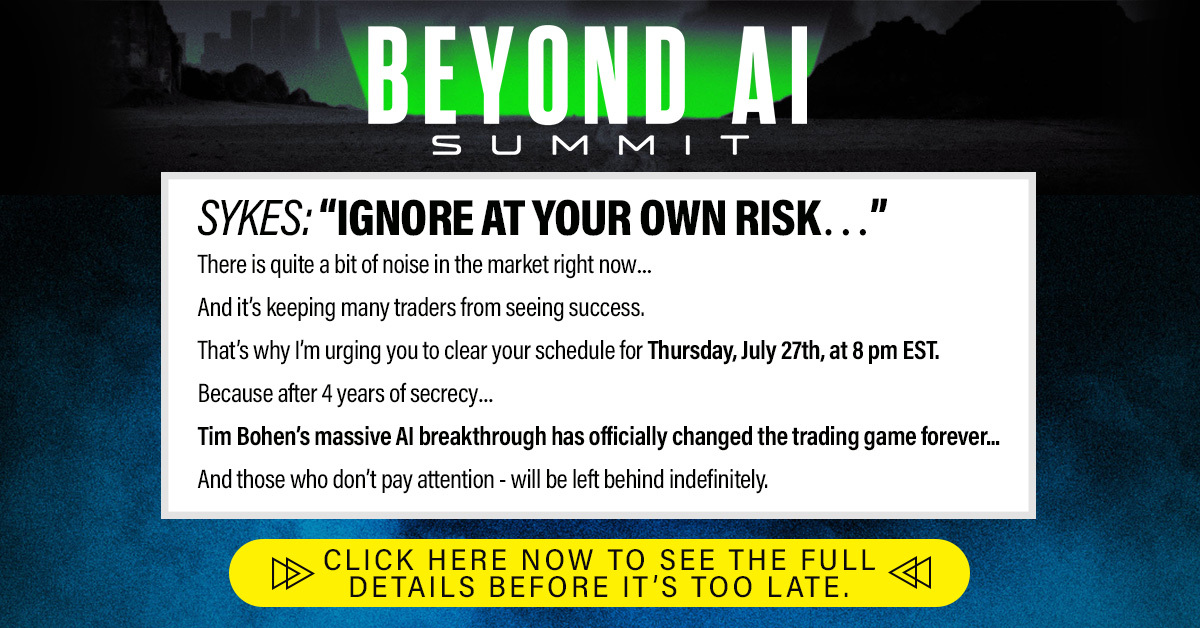Listen…
It’s time to address some common concerns I hear from prospective traders and bust some myths about the stock market…
Today, I’ll show you…
- How to strike a balance between risk-taking and preserving your capital…
- That you don’t need to be a financial wizard to succeed in trading…
- Why you shouldn’t be intimidated by the big players in the market…
- The unique advantages individual traders (like YOU) have over hedge funds…
- Essential time management tips for fitting trading into a busy schedule…
If these sound like concerns you have or tips you could benefit from, keep reading…
But first…
SPECIAL ANNOUNCEMENT: The Beyond AI Summit is TODAY!
As an Evolver, you’re personally invited to Tim Bohen’s “Beyond AI Summit” — the most historic and groundbreaking event of his 20+ year trading career…
During his first-ever unveiling TONIGHT, July 27th at 8 pm Eastern, Tim will share a live demo demonstration of an unusual “stock scoring” system called IRIS.
I can’t give anything else away yet. You’ll have to SIGN UP NOW and TUNE IN TONIGHT…
And now that you’re registered, let’s get back to common trading concerns…
Concern #1: Risk of Loss
Trading the stock market involves inherent financial risks. You’re making bets.
If you don’t have skin in the game, you have no opportunity to profit.
And some prospective traders avoid the markets entirely because they fear losing money.
I’m not saying it’s not perfectly natural to worry about the possibility of losing money in the stock market.
That said, trading isn’t for everyone. Some people have zero tolerance for financial risk. The prospect of losing a dollar will keep them from sleeping at night.
Obviously, those people shouldn’t be trading. But if you’re reading this, I’m guessing you’re not in that category. You must have some appetite for risk-taking.
But you need to balance that risk appetite with a healthy conservatism when it comes to your trading…
To avoid the fear of losing, start small with money you can afford to lose. Understand the position sizes you’re comfortable with.
Ask yourself … If you lost 100% of the money you’re betting on a single options trade, would you be devastated?
If the answer is yes, you’re sizing too big. Perfect your sizing and your fear of loss should be greatly diminished.
Concern #2: Lack of Knowledge and Experience
Some prospective traders may worry about not having enough knowledge or experience to make informed decisions about which stocks to trade (or how to trade them effectively).
These newbies think you need to have the business brilliance of Warren Buffett to be a profitable trader.
But this is a fallacy. Take me, for example…
When I first started in Tim Sykes’ Trading Challenge … I knew practically nothing about trading the stock market.
But I had something other newbies were lacking … an unparalleled passion and dedication to my craft.
I transcribed every one of Sykes’ webinars and watched them THREE TIMES each!
Additionally, I read both of Sykes’ books:
And this was years ago. There’s so much more educational information out there today than when I first started trading…
For example, you can now also read my ebook, The Ultimate Options Trading Blueprint for Small Accounts!
So, don’t let a lack of knowledge discourage you from trading. Start doing the hard work that losing traders aren’t willing to!
Concern #3: Competition and Institutional Advantage
Individual traders often feel intimidated by the presence of institutional investors and high-frequency trading algorithms, which may have an advantage due to sophisticated tools and large resources.
But I think this concern comes down to focusing on the wrong things.
As an individual retail trader, you aren’t really competing against hedge funds, institutions, and big banks.
Trust me, a massive hedge fund doesn’t care about the 200 options contracts you’re buying. It doesn’t even cross their radar.
There are some exceptions, like the once-in-a-lifetime short squeeze in GameStop Corp. (NYSE: GME). But for the most part, retail trading is totally insignificant to large institutions.
On the contrary, being a small individual trader can have huge advantages…
First, it’s more straightforward to leverage a small account into a big one than it is to grow an already-enormous account.
As an individual trader, you don’t have to worry about filling huge orders, and liquidity will never be a concern.
But hedge funds (often dealing in billions of dollars at a time), can’t buy, say, 1 million out-of-the-money contracts in one fell swoop.
There’s literally not enough liquidity for these institutions to make the sorts of trades I do at the size necessary for them.
This is why hedge funds and institutions focus on large-scale equity positions, making their gains on small % moves in massive positions.
Bottom Line: It’s a lot easier to “beat the market” with $100,000 vs. $100 million!
Concern #4: Time Commitment
I hear some people say “I don’t have enough time to trade. If I had more free time, I would dedicate myself to learning how to trade.”
But this never really made sense to me…
You see, the same people who will complain about not having the time to learn how to trade will spend years earning a degree that gets them nowhere.
Or worse, they’ll sit around and play video games all day.
Listen. You need to hear this…
To be a winning trader, you must make sacrifices. And one of those major sacrifices is time. Take it from me…
I work all day every day. Granted, I love what I do, but I didn’t get here by being lazy and watching Netflix.
When I’m not actively hosting a webinar, writing one of these blog posts, or actively trading the markets — I’m studying and looking for ways to improve my performance.
What’s more, I manage to cram all of this in while being a dedicated father to the three little Croocks running around my house!
If you really examine how you spend your days, you’ll probably find there’s some mind-numbing waste of time you engage in regularly that could easily be replaced with studying the markets.
Plus, don’t sleep on part-time traders. I know many who work tirelessly at trading while still finding time to complete the tasks required for their day job.
Bottom Line: If you wanna become a successful trader, you’ve gotta find the time to focus on your goals.
Final Thoughts
I find that most of the common concerns and fears prospective traders have are either misplaced or easily solved.
That doesn’t mean trading’s for everyone, as we’ve determined that some personality types aren’t cut out for the stock market.
But as long as you’re not overly risk-averse, the concerns we talked about today shouldn’t keep you from exploring your potential as a trader.


